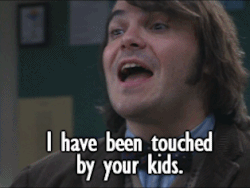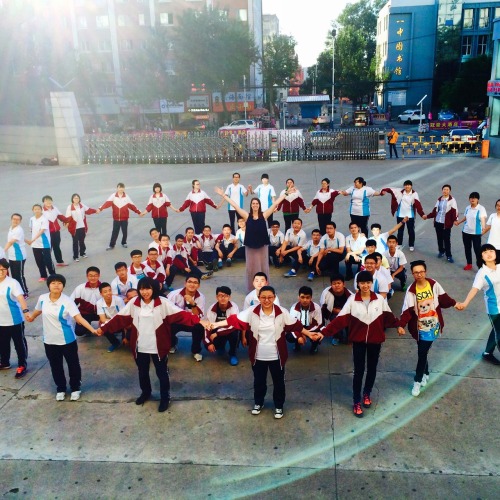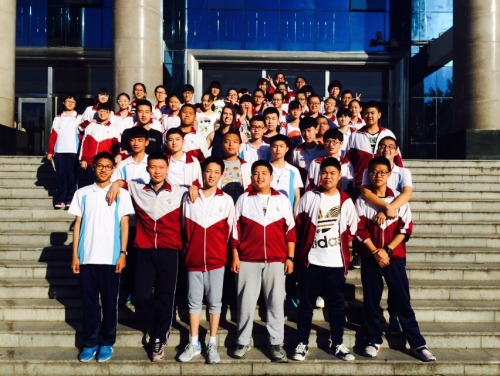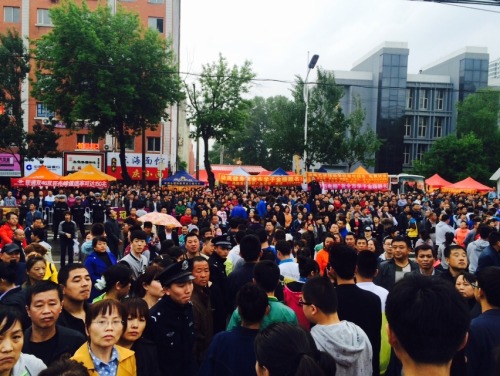#teaching abroad
I’m now sitting in the New York airport unable to believe that my time in Hegang is over. I wish I could say the time flew by but I can specifically remember times when I swore time was slowing down. But now that it’s over it’s hard to believe all that happened. Maybe it’s because I have been traveling for about 36 hours now but it almost feels like a dream. It wasn’t easy saying goodbye to all of my friends and students, especially knowing I most likely won’t see many of these people, who touched my life, ever again. Hegang gave me some difficult times but it also gave me some spectacular memories and wonderful friends. I will always be grateful for my experience and have a special place in my heart for Hegang, China.
My official goodbye dinner with the headmaster of the school. I got a certificate for completing my teaching and my assistants also got a certificate for helping out that crazy foreign teacher.
Post link
I had to say goodbye to all four of my classes. Even though there were days when they were a complete pain, I will miss them and I am so lucky I was able to teach each and every one of my students. I hope I taught them something because they definitely taught me a lot and I will always be grateful.
Post link
I was asked to write a letter for future foreign teachers at Hegang Number one High School and thought I would share it with you:

It’s funny, I have read so may articles about what it’s like to live abroad. And almost all of them mention making friends with other foreigners. But what if you are the ONLY foreigner? And you can only speak the same language as a handful of people. And everything you see is in a language you don’t understand. I doubt many people will ever be in this situation but it happens to be the situation I’m in.
For those that don’t know me, I am an only child and an extreme extrovert. I remember times when I was little and I would call all of my friends to hang out and no one could play and I would have a mild panic attack thinking about how I had to be alone for the day. And my mom would be like, Lucy chill!!!……It’s funny, you would think as an only child I would be good at being alone but actually I was just good at finding people to be friends with. It really wasn’t until college that I could really be at peace with being alone for a day or more. So, China was a huge step, and I knew it would be.
Now, Im not trying to have anyone feel bad for me, I have made friends. I play volleyball with a group of people twice a week, I have lunch with a group of teachers 4 days a week but about 95% of my dinners are alone. Dinners were always important to my family. We always ate together, and we always talked about our day… So that’s why at dinner… I feel the most alone.
But being alone to the extreme… has really given me the opportunity to grow, more than I think anything else could. I have now found out how to be content alone. Notice I didn’t say happy, I am and will always be an extrovert and being around others brings me the most joy but as the extrovert I am, I have now found a way to be content alone…. Which is HUGE for me.
So for you extreme extroverts out there, it is possible to wake up in the morning with a smile on your face while feeling alone. Interactions with people are what bring me the most joy. So when that was lacking I just had to find new things to bring me happiness, like exercising, listening to music, and just enjoying the sunshine. Hegang has been a great challenge and I feel very lucky that I was given the opportunity to face it and learn how to make myself happy in different ways that don’t involve other people.
Parents trying to patiently wait for their children as they come out of the first day of Gaokao, the Chinese College entrance Exam. There are police officers and fire men there to control the crowd.
Post link
When some of my students in my year 2 classes found out they didn’t have class in my birthday they told me that since the next day was Labor Day and we wouldn’t have school, that they would throw me a party.
Because of the Chinese culture, non of the girls students’ parents allowed them to come so it was all boys. Before going to dinner we had complete “bro-time” and of course they loved Jon. We were at one of the students apartments. His mom welcomed us at the door and then my student basically pushed his mom out the door so we could all hang out, like any high school boy would do. We talked about all of the necessary topics…. First they talked about video games for what seemed like 80% of the time and LOVED that Jon knew of the games that they played. Then they filled me in on how one of their friends wasn’t their because he had a date with his first girlfriend today. And then of course the most important topic… They taught us Chinese curse words.
After our “bro-time” the boys took us to this amazing Chinese restaurant. They were so sweet and got me a HUGE birthday cake (about 4 times the size of the cake the teachers got me). Jon is still getting used to chopsticks. So, when the boys told him to try the food he struggled to pick up the food and put it on his plate, but when he finally got it, all of the boys cheered! They were so great! One of my students ( the English name he chose was soup) sat next to Jon and helped him out and put food on his plate because he knew Jon was struggling.
When it was time for us to get rice a boy yelled to me “BIRTHDAY NOODLES”… Umm what? So I got a bowl of one Looonnnggg noodle. For this Chinese tradition I had to eat as much of the noodle as I could without it breaking and they count. I think it was whatever number they count to was how many more years I live. I got to 34… I thought that was bad but they told me I did good but hopefully I’ll live longer than 34 years…
My students were amazing and made me and Jon feel so loved! Nothing like a birthday to remind you how blessed you are!
We all have preconceived notions of certain countries and cultures. We might even understand that these are gross generalizations but that doesn’t keep us from believing them. The French have quite a few preconceived ideas on what it means to be American. I’m going to explore where these stereotypes might come from.
*Disclaimer: This is all (slightly researched) speculation. *

1. Americans are stupid
Americans have the unfortunate stereotype of being not so bright. Many Europeans would agree. Is there some truth to this? Well according to OECD (Organization for Economic Cooperation and Development), the U.S ranks 26th worldwide in scholastic test scores, below other world powers such as France, Germany, and China. But this is only proof if you believe that test scores accurately define intelligence. Also, the typical French person probably doesn’t know this statistic…so why do they think we’re “idiots”?
Probably because we are generally ignorant of the world around us. Who’s the Prime Minister of the UK? What political scandal is currently going on in Brazil? What is ISIS? The reality is many Europeans could answer these questions and many Americans could not. The other day I watched this American girl try to order at a french bakery. This first thing she said was “Hola” (*face palm*) and then she very loudly asked for a sandwhich in english, as if yelling would help the cashier understand her better. This is the American traveler in a nutshell - we go overseas without any regard for common practices, norms, or courtesies. This lack of cultural curiosity is what probably makes us seem uninformed, silly, and quite frankly, stupid.
2. Americans are superficial
Outsiders believe that all we care about is our looks, status, and wealth. Materialistic is our name and consumerism is our game. But like, we can’t like, be bothered with things like “inner beauty”. I mean, duh, we have reps to protect!
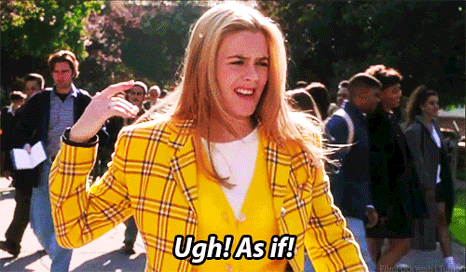
It’s not hard to understand why one would come to this conclusion of us. Watch American TV for 30 minutes and you will see how we eat up ideas of popularity and wealth. I mean we are the same country that has made famous-for-nothing Kardashians a household name. We’re also the same country that lets Channing Tatum “act” and lets Taylor Swift whine on every stage. I must admit (ashamedly) that I’ve thought to myself, “Wow, french actors and singers are not attractive”. But their celebrities are actually famous for being talented. Crazy concept, right?
3. Americans are conservative
One day when I was babysitting, I took the kids to the park. On the side of a building was a LARGE ad for a burlesque show with a topless woman gracing center stage. I remember feeling appalled. This is a park where children come to play! I looked around and none of the moms or their kids paid it any attention, almost as if this was normal. Am I a prude? No, I’m just American.
When it comes to nudity, cursing, or anything else considered taboo, we tend to censure it. These things are typically reserved for private spaces among adults. But in France, whether its in the media or in real life, they are much less likely to censor themselves.
Theory time: Part of this may be because we are a much more religious country than France. Although we express freedom of religion within our Constitution, we cannot deny that our country was founded on Christian principles and those principles manifest themselves within our political, social, and cultural identity. Around 88% of American citizens are affiliated with a religion compared to almost 55% of French citizens. Why are LGBT and female reproductive rights hot button issues? Why is the drinking age still 21 years old? Because of persisting conservative sentiments. Perhaps we hold more modest values because of our country’s subconscious (or maybe not so subconscious) ties to religion.
4. America is dangerous and racist

To many outsiders, most of our major cities are synonymous with danger. New York. Miami. Chicago. I’ve been asked several times by wide-eyed Frenchies if I’ve ever visited these cities and if I’ve ever felt unsafe. What puzzles them most is why, oh why, can’t America solve its gun issue? Trust me, we’re asking ourselves the same thing. Mass shootings have become unnervingly commonplace and we are just as exhausted.
As for the racism thing, French people have televisions. They see our public discourse on police brutality, the physical aggression at Trump rallies and that same presidential candidate’s stance on Mexican immigrants. They know well that our country was built on the backs of slaves and immigrants and has a 400 year history of racial oppression and discrimination. But don’t be fooled, France is not at all a racial utopia. They’ve had their fare share of discriminatory laws over the years. However, due to our track record, its the U.S that usually wins the prize of most racist world power.
5. Americans are fat
This is without doubt the number one stereotype about Americans and unfortunately there’s a lot of merit to it. We are one of the unhealthiest countries in the world. In 2015, 74 million Americans, almost 2/3 of the country, were considered overweight or obese. Researchers predict that these numbers will only increase and by 2020, 75% of the nation will be overweight. Compared to the 40% of overweight French citizens, these numbers are quite egregious.
But what’s ironic is that we are by far more obsessed with exercise and healthy eating. We have a strong “work out culture” in the states and for most Americans the question is not whether you’re dieting but which diet you’re on. As a whole, French people don’t actively work out. In fact in the 9 months I’ve been here, I have seen one gym. ONE. And it was extremely empty. They don’t have to work at being healthy because they just naturally are. It’s not in their culture to eat large fast food portions or eat out for that matter. Where as in the US, we love to dine outside the home. Not only is it a great way to connect with friends but its convenient. And from drive-thrus to 24/7 restaurants, you cant deny our love affair with conveniency.
6. Americans are self-involved workaholics
“You can be anything you put your mind to” “Reach for the stars” “You could be the next president of the United States!”
From an early age we are told that everyone is special. That hard work is the key to success and to dream as big as possible. I asked a couple of my students what they wanted to be when they grew up and none of them had an answer. From an American perspective this is very strange. Every American child knows exactly what they want to be by the age of 3. Even if the answer is a Princess, we raise children to have a very clear and confident vision of who they are and where they are going in life.
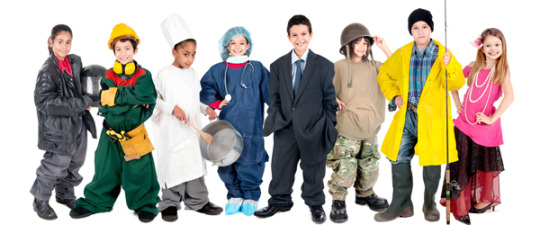
Our society is characterized by individualism. What that means is that we emphasis personal achievements, we value independence, and much of what we do in life is self-enhancing. Many countries fall into this category and you can argue that there’s nothing wrong with it. But the inevitable result of individualism is that we lose sight in the importance of people around us. We are less family-oriented and instead place more value on our personal success, which typically translates to how we perform in our careers.
Everyone is chasing the “American Dream”, hoping to make something of themselves. But instead of enjoying life, we’re too busy working hard for the money. We work 30% more than Europeans, have significantly less paid vacation time, and we’re one of the only countries that doesn’t guarantee parental leave for new mothers and fathers. We don’t value leisure time for ourselves or with our family. Maybe we are not personally “self-involved workaholics”, but the way our society is set up its almost impossible not to be.
Feeling bitter? Well let’s glance at some positive stereotypes.
7. Americans are very self-confident

8. Americans are charitable

9. Americans are super friendly

10. Americans are good looking

See, it’s not all bad.
“Ugh I didn’t like France. French people are racist”“Go to Italy! They’re so friendly and I hear they love black women”“Do Germans even have black people outside of the military?”
It’s something almost every black traveller fathoms before venturing abroad. How will my blackness be perceived in this predominantly non-black space? It’s a valid concern. At best, our otherness might put us on a flattering pedestal. At worst, we might get mistreated. Even traveling to remote areas of the U.S you will find people that stare at you and ask aggravating questions like “Can I touch your hair?”. I certainly wondered about how I’d fare as a black woman before moving to France.

But this post is really not justabout me. Yes I am black. Yes I am in Europe. But that really doesn’t make me special. Because even though only a small percentage of African Americans travel to Europe yearly, there are tens of millions of black people that are already there: Afro-Europeans.
Black people don’t just live in Africa and the United States. Thanks (but like, no thanks) to colonialism, the African diaspora truly reaches some of the most unlikely corners of the earth. Most African Americans make the mistake of assuming that we are the only group of african descendants living as the underrepresented, mistreated, systematically oppressed minorities in predominantly white spaces. Tell that to the 55 million Afro-Brazilians. Or the millions of black descendants in the UK, Italy, and France.
But our egocentricism isn’t entirely our fault. I, too, had no idea exactly how many black and brown people lived in Europe until I came here. I assumed based on films, television, and images I had seen growing up that Europe is one homogenous white continent. Full of sameness with very little variation of color or culture (or at least not culture from an ethnic standpoint). It’s the invisible diversity of Europe. In the same way African-Americans lack representation in almost all facets of our society, Afro-Europeans lack it even more.

I had met a lot of people my first couple of months in France but I still felt something was missing. I yearned to connect with people that were like-minded. People in which I had an inevitable bond with. In short, I needed to make black friends. It sounds silly to some but anyone a part of a minority group in some way (race, sexuality, etc) understands this desire.
The problem was never the lack of black people, but how to organically make friends with them. Making friends as an adult is not an easy feat. When you’re a kid it’s so easy! All you have to do is say this:
But how do you tell a random person you think they’re kinda cool and we should hang out in the most platonic way possible without being creepy?
Several months later and I’ve met friends of friends, connected with random people through social media, and have even joined a Black Expats in Paris meet-up. By speaking with people I’ve gathered quite a few perspectives.
African Americans are both admired and envied in France. Believe it or not, we have the type of global visibility not afforded to others of the African Diaspora. African Americans are the examples of cool, the creators of pop culture. Our celebrities are their celebrities, our favorite TV shows are their favorites too. African Americans are vocal in periods of inequality and reactionary during times of social injustice. Mike Brown & Trayvon Martin are not only names uttered on American soil. “I Have a Dream” is familiar to all European ears, the “Black Lives Matter” cry has been heard around world and the Civil Rights Movement is a part of their curriculum just as much as ours. In short, the Black American experience has left a definite mark in world history.
For Black Europeans, however, their history tends to get shoved under the rug. I am not AT ALL an expert on this topic but here is a concise history of European colonization in Africa in my own words.
**Anndi’s Quick and Over-simplified History on the Conquest of Africa**
In the late 1800s, several European countries such as the UK, France, and Portugal had set up port cities in Africa for trading goods and resources. Everything was cool until this dude named King Leopold II of Belgium was like, “you know what would be awesome? My own territory in the Congo”. So homeboy sliced out a chunk of the Congo for his own PERSONAL benefit, not even in the name of Belgium. The other European powers (UK, France, Italy, Portugal, and Germany) started to freak out and thought, “Damn my ego is super big, how can I make it bigger?”. So they had a meeting in Germany, found a map of Africa, and literally cut the continent apart like slices of pizza. It’s worth mentioning that none of the African countries in question were invited to said pizza party. So NINETY PERCENT of the continent was colonized without permission,MILLIONSof Africans were forced into labor, resources were exploited, men were killed, women were raped, children were maimed, feuding ethnic groups were mixed…all under the guise that they were “saving uncivilized savages from eternal damnation”.

Flash forward several decades and the European Powers finally started to leave. Whether they left on their own accord or were driven out by revolutionary groups, the heinous effects of imperialism are evident for several African countries by way of corrupt governments, tireless civil wars, and psychological trauma.
**The End** ….Except not the end because these heinous effects still linger.
I’ve noticed a slight lack in community for Afro-French people. For African-Americans, there’s this idea of fictive kinship. I may not know you from Adam, but if we are the only two black people within a predominantly white space then we will acknowledge one another. But that’s only on a micro-level. On a macro-scale, we have become masters of creating spaces for ourselves. Hair salons & barbershops, Historically Black Colleges and Universities, BET Network, NAACP… we have a black national anthem!! All with the intent of uplifting and strengthening one another, for validating our place in a society not made for us.
But our sense of community derives from our shared experiences. Many of our ancestors were slaves. Many of our living relatives grew up in segregation. For France, and many other European countries, the experiences of black europeans, while similar, are not identical nor are they shared. At any rate, its hard to have a sense of community when you don’t even know how many people of African descent live in your country. Apparently, taking an ethnic census is constitutionally banned in France.
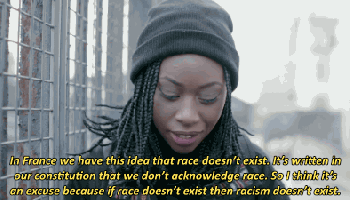
For Afro-french people, they’re not bound together by race as much as their family origins. If you’re a black woman from Guadeloupe, you might feel a bigger bond to people from the West Indies than to those from West Africa. Honestly, I envy greatly that Afro-Europeans know exactly where they come from and even have family that still live in those countries. I have never felt so shameful about not knowing my roots until moving here. Every time I meet an Afro-french person for the first time, the conversation goes as follows.
Them:So where are you from?
Me:I’m from the U.S!
Them:Yeah, I know. But like where are you really from?
Me: Washington, DC.
Them:What’s your family origin I mean to say.
Me:Um…I don’t know? My ancestors were slaves so…
Them:…..
Me:…..Nice meeting you!
In general, there’s this idea that black people are never really from whatever predominantly white country they reside in. Afro-french people can be born and raised in Paris and never feel or be seen as “french”. Even when I meet White Europeans, they are generally skeptical about my origin story but for a different reason. Because I have a lighter skin tone than most Afro-french, many assume that I am “métisse” or mixed. During my trip to Italy, an italian man told me “You’re beautiful. I love mulattowomen”. The assumption really bothers me because black and beautiful are not mutually exclusive concepts homeboy! But I do love their faces of disappointment when I tell them I am proudly, undeniably, 100% BLACK.
But let’s discuss some positives, for there are many. While Black French don’t organize against injustices in the same way we do, that doesn’t mean they aren’t having these important conversations. The Afro-fem movement seems to be really big here. I’ve seen countless articles, youtube videos, tweets, and have even been invited to conferences by Afro-feminists to discuss the interesting balance of race and gender.
I’ve met so many black french women who are smart and woke. Clever and funny. Women who want to be a voice for their community. Women who are artists, poets, and singers. Women who are beautiful inside and out. Women who are writers. Women who are fly. Women who are college educated. Women who want to uplift and strengthen their fellow sisters. Women who want to be a vessel for serious change in their society.

So don’t sleep on Afro-Europeans. They have a very real place in our world.
I would be remiss not to mention the Strolling Series by Cecile Emeke, which was in truth my personal introduction to Afro-European voices. Cecile Emeke is a British woman who brilliantly decided to film black individuals across the African diaspora. The result? Unraveling the generalized blanket of our black experiences into singular, personal threads of testimony. Emeke has filmed in the Netherlands, Italy, Jamaica, and many other countries and its widespread appeal has garnered a huge Youtube following. Of course, you’ll hear the familiar stories of micro-agressions, respectability politics, and self-love affirmation. But you’ll also hear views on mental health, sexual orientation & expression, capitalism, veganism, colonial reparations, and a plethora of other subjects not often heard from black standpoints.
If you’re interested, I would start with one of my three favorites: Two Black Friends in France ,One Black Male Feminist from the UK, orA Black Actress in London.
So what does it mean to be Black in Europe? I have the same answer for someone who would ask what its like to be black in the U.S. There is no simple answer. The culture, the attitudes, the ideas, the joys, the struggles of black people are not monolithic. They are varied. They are nuanced. They may intersect but they don’t coalesce.
I write this to say there is more to the black experience than what you have experienced personally. I think its important not only to have conversations on blackness within the US but in a global context as well. And lets remind ourselves that as Black Americans, our global visibility gives us a certain level of privilege. The next time you say #BlackLivesMatter, mentally expand that demand outside of North America. When you think of the black community, challenge yourself to think beyond your own borders.
And if you’re able, travel abroad. Talk to people. Have these discussions. Your eyes and minds will open wider than you know.

Conjugation, subject-verb agreement, verb tenses…is there anything more clinical than learning a language at school? While these are all necessary elements of language learning, real fluency is born from listening to native speakers in their natural element.
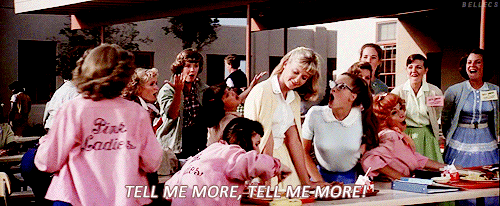
I’m talking about the type of mannerisms and peculiarities even native speakers don’t know about themselves! Sure you can write a 10-page essay in impeccable french, but can you gab with the girls at the hair salon? Here are the five language nuances your teacher won’t teach you.
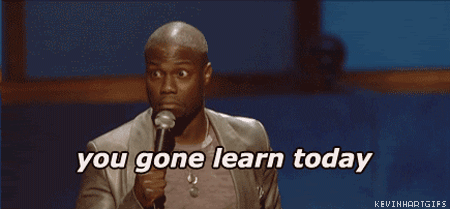
1. Inflections
Languages don’t sound the same. That’s an obvious statement. But even the inflections and vocal tones don’t necessarily translate. For example, in english, depending on the context, we don’t necessarily need to go up at the end of a question. But in french, its essential. I’ve even been told before that even though my american accent is often undetectable, I speak in an american rhythm. I’m not sure what that means but it just emphasizes how these subtle idiosyncracies can make the difference.
2. Interjections
I always thought interjections were intuitive. Actually, I never thought about them much at all until I moved to France. But I quickly realized that interjections are a learned part of language. If you stub your toe, you’re not going to say “ouch”. You should say “Ouïe”. If you eat something gross, you’ll get quite a few looks if you say “yuck” instead of “Beurk”. Even animals aren’t safe. Ducks don’t quack and pigs don’t oink. One of my classes (embarrassingly) had me imitate the entire animal kingdom because they found the differences so peculiar. At any rate, it’s definitely worth looking these interjections up because they’re a huge part of language.
3. Facial Expressions
The french are quite facially expressive people. It’s quite entertaining as an outsider and all expats notice this right away. My favorite expression is the dumbfounded look my students give me when they have no idea what I’ve said. They widen their eyes and puff their cheeks like a blowfish…it’s hilarious. You can see that look HEREat 0:49. But what struck me most is how uniform that look is, which indicates that is cultural more than it is individual.
4. Hand gestures
The french start counting with their thumb instead of their index finger, the “Ok” sign actually means “zero”, and rubbing your nose means you’re drunk. Hand gestures are definitely cultural. It’s recommended before going to any country to look these up because you may think you’re giving the thumbs up but instead you’ve just started a fight in public. Typically, you won’t find these cultural differences in a textbook.
5. Idioms
One day I asked a friend what she thought of this guy she was seeing.
Her response: “Il est sympa, mais il se regarde le nombril (He’s nice but he looks at his bellybutton).
My first thought: “….That’s weird”
What I didn’t know (and didn’t find out until a week later) was that se regarder le nombril is an idiomatic expression that describes someone as egotistical or narcissistic.
Idioms are a little harder to prepare yourself for because the possibilities are endless and often the expression holds very little indication of what it actually means. However, whenever you hear one try hard to remember it and challenge yourself to use it in another situation.
Have you ever been carried by a French firefighter to the hospital?
I have.
Last week I was set to leave for Rome for 5 days with a friend. I was practically skipping with excitement days prior. I learned rudimentary italian on Duolingo, I watched the Lizzie McGuire Movie in preparation, and I fantasized about buttery noodles I can’t pronounce while practicing various poses for Instagram. I was ready! After being in wine and cheese France for 6 months, I couldn’t wait to get a taste of another culture.

Seven hours before take off, I get on the bus to the airport. (I live really far away and had planned to meet my friend at her house beforehand). As I’m still searching for a seat, the bus goes Herby Fully Loaded on me and totally throws me off balance. Before I know it I’m on the floor bleeding from my leg on a bus full of a people. No one offered to help me. Gotta love the french!
I boogie-board the bus all the way to the train station. It’s 11pm and only the most precarious characters are around. My jeans and brand new white converses are now soaked in blood. *Cue nervous laughter* as I realize I look like the Walking Dead. So I limp-run through the platform in search of a bathroom. I finally find one not occupied by a homeless man but only to find out theres no toilet paper or paper towels. Parfait.
Being the adult that I am, I call my daddy 6,000 miles away for advice. “ You should probably go to a hospital”, he suggests. Of course. Why on earth didn’t I think of that?
I try to call 911 and then remember that 911 is an American emergency number. What’s the French emergency number. WHY on earth don’t I know this?!?! I’m a terrible expat.
Six hours before take off and I am officially panicking. Because I’m in a train station in Nowhereville, France, I decide to (literally) hop on the train to the next more populated station. I get there to find it equally deserted. But that’s when Antoine the Firefighter saved found me. He calls an ambulance and it arrives in lightening speed. Antoine decides to board the ambulance like the gentleman he is. Antoine is cute. I’m in love with Antoine. He starts asking me all these personal questions, like where I live, what I do, and my phone number. Naturally I start flirting back until I realize he’s just filling out out my medical release form.

I’m wheeled into the ER, large suitcase in my lap, to find everyone and their mother and their mother’s mother waiting on a doctor. All I can think about is Rome. “How long is this going to take? I have a flight to catch!” Must. Have. BUTTERY NOODLES. My desperation earns me a seat at the front of line. I even cut a sick baby and woman that looks like the Crypt Keeper but scarier.
Five hours before take off and I finally see a doctor. His name is Doogie Howser. Seriously how old was this kid? After clumsily applying anesthesia, Doogie administers six sloppy stitches to my shin. I can tell he’s as nervous as I am because his hand is shaking and he keeps asking the real doctor, “is this good?”. I’m too anxious to care because all I can think about is my flight and the fact that my white shoes are ruined. Mind you I am documenting this entire ordeal on Snapchat because I’m a millennial and thats just what we do.

Four hours before take-off and I am unceremoniously released from the ER with a long list of prescriptions. I have no idea how I’m supposed to pick up said prescriptions considering its 2am and none of the pharmacies are open until after I leave for Rome. “Italy has pharmacies too” , says the sassy, disgruntled front desk lady.
Three hours before take-off, I finally meet up with my friend at her house. The airport is 25-30 minutes away from her house but because we’re cheap we decide to take an hour long night bus for 2 euros instead of a 40 euro taxi. I don’t know what type of people I expected to be on the bus at 3am….but the sketch parade was in full force. Every stop the passengers are creepier than the last. They bus lights were dimmed, the rain came down hard, and the windows were so foggy we couldn’t even see the buildings. We clung to one another the whole 60 minutes.
Ten minutes before take-off. The anesthesia is starting to wear off, I’ve thrown back some Ibuprofen, and I’m sitting window seat next to a priest. The meds kick in just in time for take off and I realize I haven’t slept in almost 24 hours. I knock out before the plane even leaves the ground. The End.
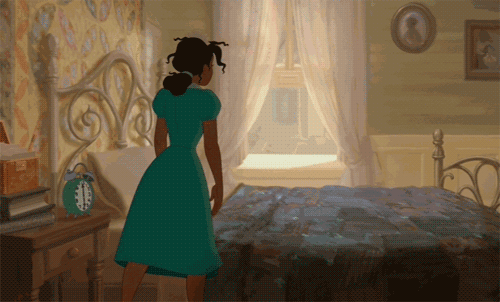
What Did We Learn:
- Don’t take public transportation by yourself after midnight.
- Always know the emergency numbers in whatever country you’re in.
- Ask more questions on the credentials of people operating on you (if need be).
- Trust french firefighters, especially if his name is Antoine.
When I first applied to teach abroad, there was a section of the application that asked if I was willing to work in a Zone Urbaine Sensible (ZUS). Sensitive Urban Zone is just a fancy term for po’ & run down. A ZUS typically has a high percentage of public housing, high rates of unemployment, and very low percentages of high school degrees. In the United States we tend to refer to these places as the inner-city, but in Paris most of these neighborhoods are found in les banlieues just outside of the city.
So knowing all of this before applying, I reluctantly marked a check in the square box. Why on earth would I agree to this, you ask? A couple reasons. The main reason being I was desperate to get into the program and thought that since many people would say no, this might help my chances. The second reason is because I wanted to have students from diverse ethnic and cultural backgrounds. I grew up in the Washington, DC metropolitan area and I am just in general used to that type of environment. But I didn’t imagine how much I would enjoy the experience.
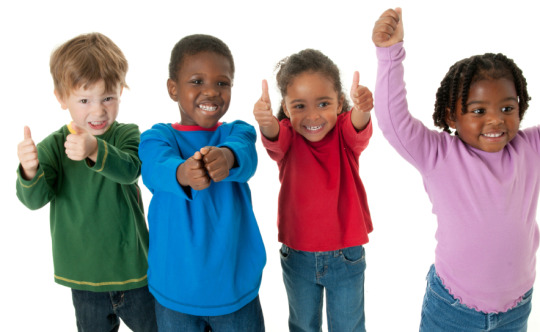
So I ended up being placed in 3 schools in 2 different cities. Two of my schools are in a nice, clean middle class community. There are town hall meetings, weekly farmer’s markets, community centers, a movie theater, and everything a good ‘ole town needs to feel complete. The other school is placed in a town that…has a lot to be desired. Its funny because these cities are RIGHT next to one another but if you go 5 minutes in the other direction it feels like a different world.
The “lesser” city is not a ZUS but its probably one more project building away from it. When I told my other schools that I was teaching there, they all got wide eyed. “Oh you’ll never be able to control those kids. They’re wild. They all come from broken homes”. Even the teachers at that very “wild” school warned me before I entered the first day that they have a hard time controlling their students. All of a sudden I was scared. Wild? Uncontrollable? Am I about to be a teacher or a lion tamer?
“How bad could they be?”, I thought. “They’re in elementary school for crying out loud.”
I didn’t know how I would be received that first day but I certainly was not prepared for what I got. I walked in and was pleasantly surprised to see a sea of black and brown faces. Most of them are children of first generation immigrants from North and West Africa. I even have a handful of students from Cambodia, Vietnam, and India. Their excitement was borderline fanatical. I felt like a rockstar. Rich Homie Quan was right, I DO “be feeling like the man when I walk through”. Everyone came running up to me, asking me questions, shouting my name as if they’d known me for years. I finally know how Beyonce feels on the red carpet.

I’m sure there are several reasons why their love for me was so instantaneous. Maybe its because I’m American. Maybe it’s because I’m considerably cooleryounger than the other teachers. But I can’t help but feel like the main reason is simply because I am black.
We all know that representation matters. Typically when we speak on representation, we are referring to movies, sports, politics or some other platform seen behind a screen. Recent uproar on the lack of diversity within the Oscars is proof of that. But rarely do we consider the affect representation might have within an interpersonal relationship. Of all three schools, among roughly 30-40 educators, I am the only teacher of color. In schools that are made up of almost 90% minorities, you can imagine the message that subconsciously sends to the students.
I’ve learned that being Black American is also synonymous with “cool” in France. One of the first questions my 4th graders asked me that first day was if I knew how to whip and nae-nae. Immediately, almost as if rehearsed, the class sprang up and started singing and dancing that incredibly annoying popular song by Silento. The principal was shouting, attempting to calm them down but something possessed me to dance with them. Their reaction was hilarious. They clapped and cheered as if I had finished the decathlon. I was given a “cool” test and I passed with flying colors.
They love to bombard me with stereotypical questions:
Are you related to Obama?No.
Have you met him?No.
Have you seen the Queen?I’m not British.
Have you been to New York? Yes.
Do you eat hamburgers everyday?I wish.
Have you met a cowboy?….No..?
Do you wear flip flops?Huh?
Have you visited Big Ben? Again, Maxime, I’m not British.
In the first week I created a slideshow about my life in the US. I included pictures of my friends, family, doing activities growing up, etc. They went crazy over my cheerleading photo, thinking that was only something they see in movies. And they oo-ed and ah-ed when they saw how big my college football stadium was. But there were two photos in particular that really took them aback.
One picture was a photo of my sorority sisters and I at graduation, laughing with our caps on tight and tassles swinging high in the air. I had hoped they saw what I saw: Women with degrees. ** Black Girl Magic **.
The other photo was of me in front of the Lincoln Memorial. Unsure of their familiarity with American history, I noted that Lincoln is most known for liberating blacks from slavery during his presidency and then explained how Martin Luther King gave his famous “I Have a Dream” speech in that very same location. For some of them it went over their heads but I could tell some were reflecting quietly on this. They were wide-eyed when I said MLK has his own memorial in DC and that a Black History Museum is currently being built.
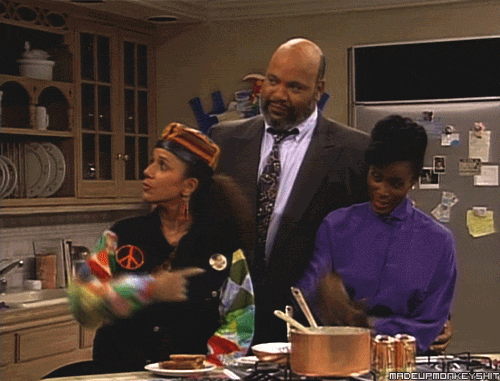
Imagine speaking in front of black and brown children who live in a country that rarely, if ever, discusses their ancestor’s history. And then telling them that there is a country, which is predominately white, that actually gives months and national holidays dedicated to the celebration and remembrance of people of color. To us, Black/Hispanic/Asian History Month is commonplace, but in France this is a mind-blowing, foreign concept.
After class ended that day, one of my students came up and asked where I was from. “The United States of course!” I responded.
“No,” she corrected. “I mean where are you from originally”
This is a question I’ve grown quite accustomed to being asked here. In France, people of color are never seen as just black, or maghrebin(people from North Africa), or asian, etc. Where your ancestral roots lie are a big part of you. I finally told her, “My family has been in the US for centuries. I don’t know which African country I’m originally from”.
“Oh,”she said disappointedly. “I was hoping you were from Cameroon like me”. And in that moment I wished I was too.
My students have a knack for bringing my spirits up on bad days. Thanksgiving Day was a particularly rough day for me. I was in an unhappy living situation (Read HERE), I was physically sick for the past two weeks with no medical insurance, and I was homesick on the most familial day of the year. I was eating lunch alone in the teachers lounge when one of my (favorite) 3rd grade students ran up to me and said “Happy Thanksgiving, Anndi. You are too beautiful and I love you so much”.
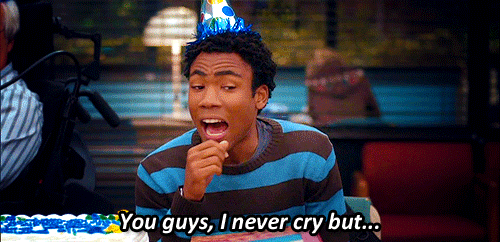
The hug she gave me was filled with so much love I could have sworn I was hugging a family member. That moment was really touching because it made me realize I was having a profound affect on someone.
It has now been 5 months teaching and the “bad” school, the one EVERYONE said I would never be able to handle, is my absolute favorite. These kids make me excited to go to work. They are so motivated to learn english. Most of the time I don’t even remember that they come from underprivileged neighborhoods. But every now and then I get reminders.
When I notice a student is wearing the same outfit several days in a row, I remember. When I ask a student why they don’t have any materials for class, I remember. When I had planned to do an activity where the whole class draws their family tree and am told by another teacher “thats not a good idea…”, then I remember.
Listen, this is not a Hallmark movie. I’m not Ron Clark or Hilary Swank from Freedom Writers, giving underprivileged children hope to strive for greatness in the midst of disparity. (I’m probably more akin to Jack Black in School of Rock). But I do feel like I’ve been making a positive impression in their lives and most of that I feel is because they somehow see themselves in me. I can’t pretend they don’t drive me crazy or act out from time to time. But at the end of the day, they’re good kids. They’re beautiful, they’re funny, they’re engaging, they’re sweet, and I am so happy to call them my students.
